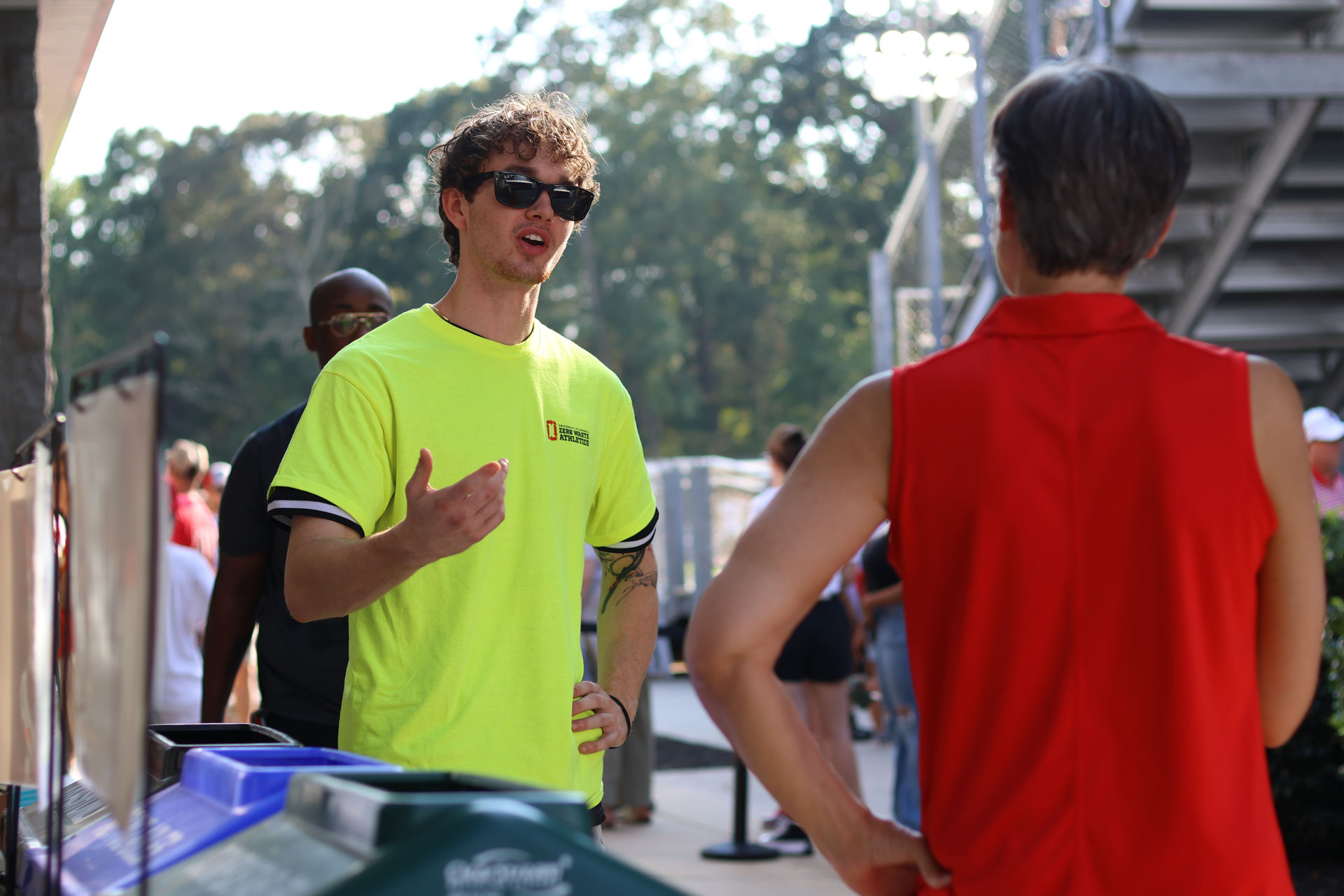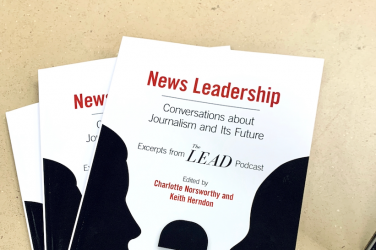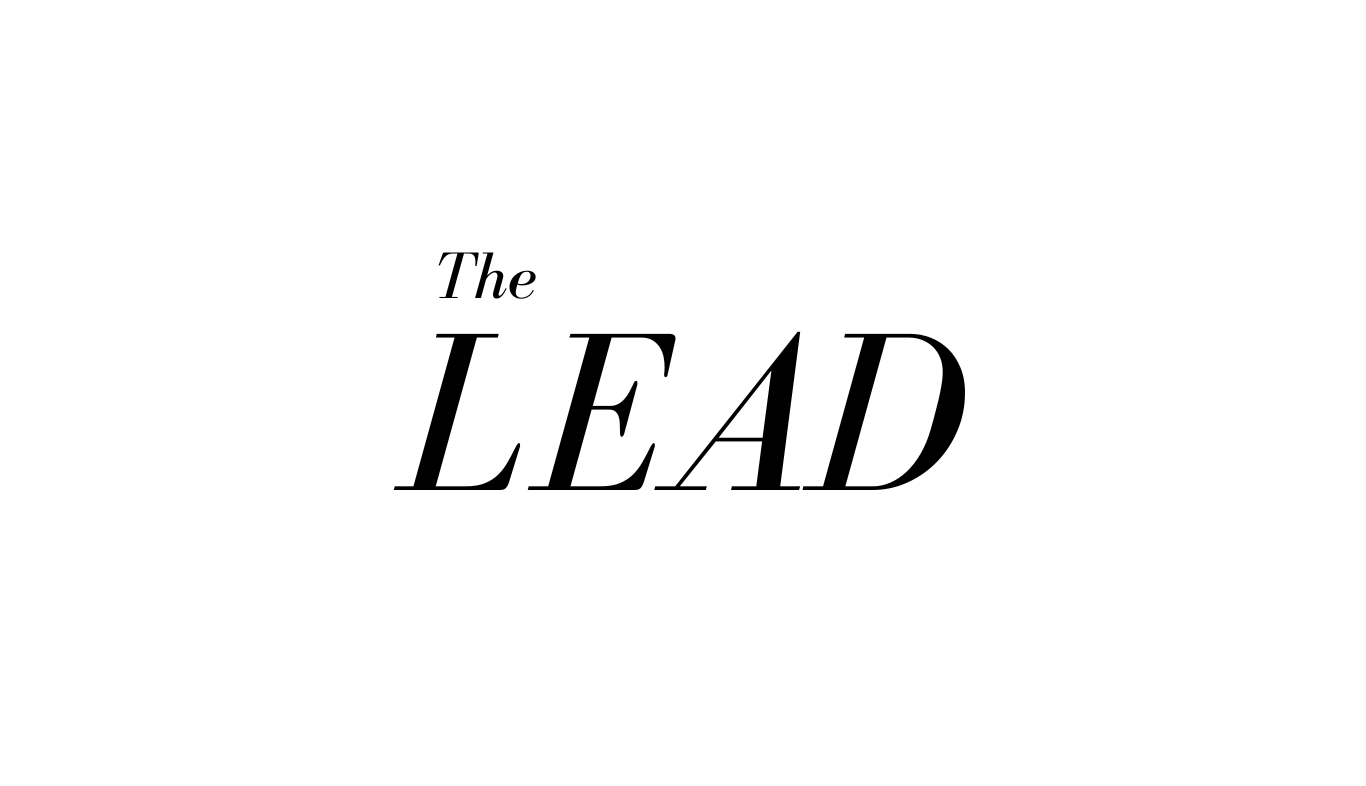I’m Chloe Savan, and I met with Sophie Ralph to discuss her story, Zero Waste Athletics At Georgia Soccer Score Goal. Ralph is a senior journalism major with certificates in Sports Media and Sustainability.
How did you find this story?
Ralph: So the Zero Waste Athletics, specifically for the soccer season, was something that was on my radar pretty early in the semester. I am a part of the sustainability certificate … and my professor had mentioned it as a volunteer opportunity. … I was looking for story ideas for my journalism capstone class and saw that there really wasn’t any coverage of this particular season. There was a lot of stories on the Zero Waste Athletics at Foley Field in the spring for their Zero Waste baseball weekend, but there really wasn’t anything covering this season.
What was your main motivation behind covering this story?
Ralph: I think that it was a really big task that they were taking on, attempting to make an entire home season for soccer zero waste. That’s not an easy feat. There’s a lot that goes into it in the planning, in the execution, getting all the volunteers. And so I thought that it was really important to kind of document their progress and how that worked to see if that could be something that could be scaled up to other sports, if that’s something that can feasibly be continued. Waste is such a big issue considering, you know, the amount of trash that UGA accumulates and the pressures that puts on Athens-Clarke County, so I just thought that it touched on a lot of different sustainability issues. But the main thing that boils down to is that I hadn’t seen a lot of coverage of it because if there were 20 stories on it, then I wouldn’t have done it.
When did you start this story? What was the timeline?
Ralph: End of August, and then early September, was the main time that I was working on it, went to a few games. And that’s when I was gathering a lot of the meat of the story. And then I’d spent the next month kind of fleshing it out and had to get a few more interviews. And then once the season ended, I went back for some follow-up interviews to kind of get a whole bigger perspective on how they thought that the season had went for Zero Waste Athletics. So it did end up taking a while, but the main bulk of it was end of August, beginning of September.
What was the hardest part of covering this story?
Ralph: This sounds maybe a little silly, but I think the hardest part for me was articulating why having a large amount of trash, and having so much waste, is bad. Because in my mind, it just seems second nature. Of course, too much trash is bad, and of course, it’s better to use materials that can be composted and recycled. But finding a way to articulate it in a scientific manner was a little bit tricky for me just because it felt so, “well, obviously.” So I really relied on my expert sources, specifically the ones at Athens-Clarke County landfill. They did a really good job of explaining everything to me in a clear but scientific manner to help me articulate why it’s bad.
What was it like visiting the landfill?
Ralph: We had to take a separate van to get to the landfill, and seeing all the trucks pale in comparison in size to the size of the landfill — it was a lot to process. And I was just whipping out my camera trying to get a photo that looked all right. But it kind of made the issue feel a lot more real because you’re seeing the direct consequences of that overconsumption. So, I think that it was definitely valuable to my storytelling, and it did help articulate through talking with Denise Plemmons, who was giving us a tour, talking with her, again, helped me process and put into words and pictures why so much waste is bad.
What was your favorite part of covering this story?
Ralph: There were a lot of fun parts about covering this story. First of all, everyone that I talked to through the sustainability certificate and the Zero Waste Athletics intern, Alex [Molfetas] … everyone was so down to talk to me, and they had a lot of interesting things to say. So working with them was great.
And then soccer is my favorite sport, so getting to go and hang out at all the soccer games, even if I didn’t get a chance to watch a ton of it, was a lot of fun. And I really love multimedia journalism, and this had a lot of photo and video components. So getting to play around with that and, you know, making trash and waste, compost, seem interesting was kind of a fun challenge.
What was something that didn’t make it into the final draft?
Ralph: Some stuff that didn’t make the [story] were comments that were actually made off the record, so I can’t share them. I understand why they were off the record, but sometimes I was like, “Man, I wish I could use that” because it would add a little bit more context to the story and just kind of flesh it out a little bit more.
But even comments that were made on the record, I wish I could have kept in because I made a point to ask all the people that I interviewed specifically, who were part of the sustainability certificate or intern, anything like that, I always asked them what drew them to sustainability or what drew them to Zero Waste Athletics. And they all had really interesting reasons why this was interesting to them, or this is work that they wanted to do…But just for time’s sake, you know, had to stick to the plot.
What do you hope readers take away from this story?
Ralph: I think that a lot of times, people can hear the word sustainability or zero waste and think that it’s just a far-fetched ideal. Like that can’t possibly be implemented, like it’s just not the way the world works, it doesn’t work, whatever. But I think that I would like people to walk away from the story seeing that those goals are not just fantasy; they are achievable. And obviously, it does take a lot of work and a lot of effort, but it does end up being worth it, and it’s very much in the realm of possibility.
So especially one thing that I made a point to do was get access to the records and data that one of the interns was keeping, so I could have those graphs and that data in there so that people can see I’m not just telling you that it’s possible and that it’s working. I’m going to show you. There were games that had a little bit of a dip in the diversion rate, but I wanted to show that too. It’s not completely flawless; it’s not a flawless process. But it is worth investing in, and it can work, and it is worth it.
What was something that you personally learned or took away from this whole process?
Ralph: I think that it taught me to be a much better self-editor, because especially with this story, it was probably the most elaborate — lots of moving pieces, lots of different characters and quotes. There was a lot to filter through, and I am usually terrible at cutting things down and getting to the point, taking what’s important, leaving what’s not as important.
And especially with a story that can get a little bit convoluted. When you’re talking about waste and zero waste, there’s a ton of different factors. So kind of knowing which ones to zero in on, it took a little bit of learning. But I think that’s going to be super valuable, as I would like to do more in-depth reporting in the future.
Is there anything else that you want readers to know about the story, or anything else that you’d like to share?
Ralph: It’s hard to have one main takeaway. But I think that one of the things that I sort of touched on when I was talking about the data was, this has been a really big test for me to make sources comfortable and let them share things with me, but also maintaining that level of professionalism and not including everything — having a fair view of the situation. Because obviously, I believe that Zero Waste Athletics is doing good work, but it was really important to show that there were those dips, and sometimes those contamination rates could get really high. And that shows that there could be a problem with fan education — they’re just not getting it, or they’re not following the rules, or they don’t understand them. It’s really important to acknowledge those flaws or those limitations.
In a program, especially something that’s about sustainability, it’s really important to show all sides — the good, the bad — while still and especially treating those sources with respect, so that they understand what your goal is. Your goal is to tell a true story, and that may not always flatter them. Allowing them to understand you’re still being kind to them, you’re still showing that you care about the story, that’s the most important thing. I included some of that data that maybe didn’t make them look as good, but they still knew that I cared very much about the reporting that I was doing, so there were no hurt feelings or anything like that.
Thank you so much for your time. I really appreciate you carving out some time in the middle of finals.
Ralph: Thank you so much.
Chloe Savan is a graduate student in the journalism program at the Grady College of Journalism and Mass Communication.










Show Comments (1)